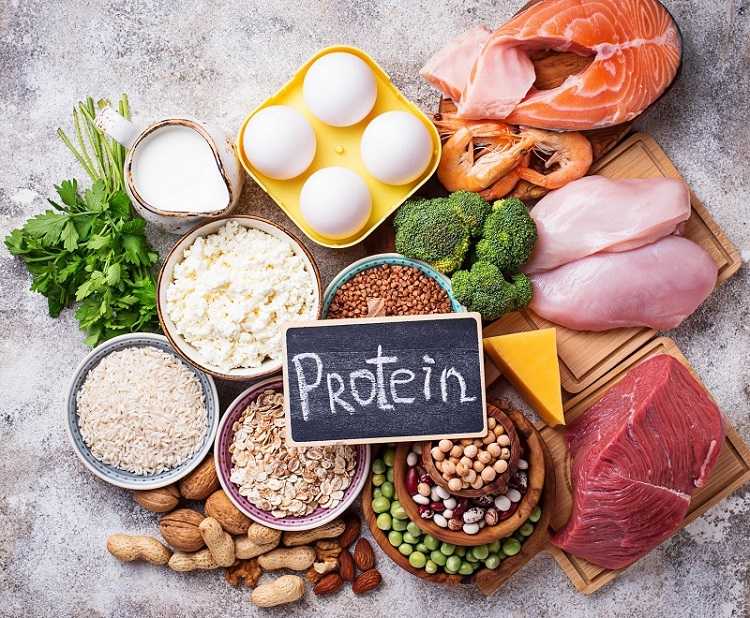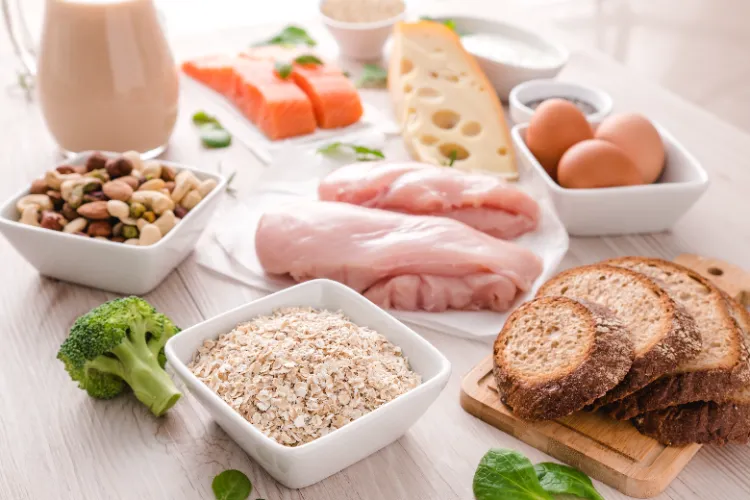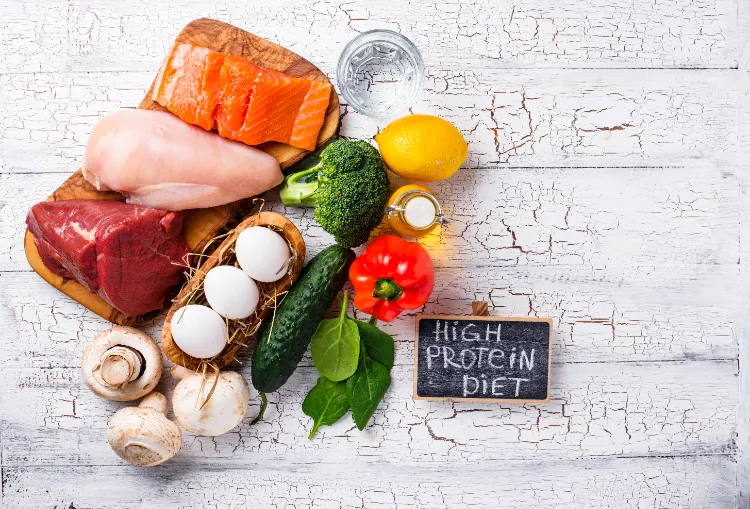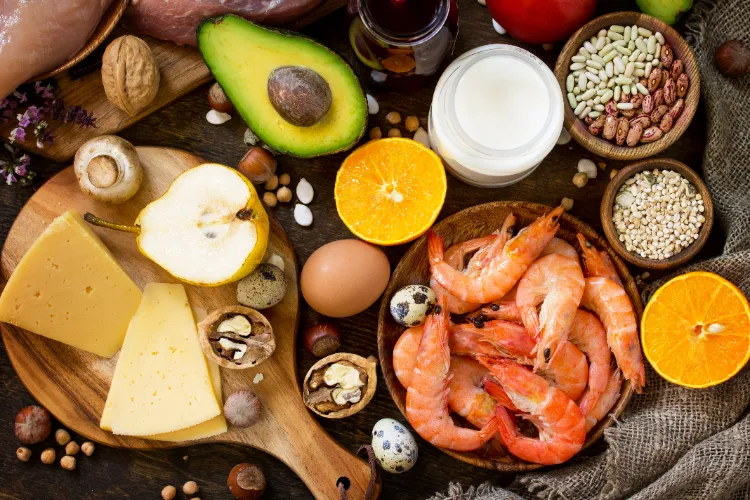In addition to fats and carbohydrates, proteins are among the most important nutrients for our body and should be an integral part of our diet. Anyone who keeps a healthy and balanced diet knows how important it is to consume enough protein. It supports muscle building, stimulates fat burning and is involved in numerous vital metabolic processes in the body. Protein is essential for us and a lack of protein can have a negative effect on our psyche and health. What are proteins anyway? What are the first protein deficiency symptoms and how much protein should we eat per day to stay healthy and fit? These are probably questions that each of us has. Find out the answers, as well as the best sources of protein for a healthy diet.
What Are Proteins and Why Does the Body Need Them?

Before we delve deeper into the signs of protein deficiency, let’s briefly explain what proteins are. We all know that these are important for building muscle and stimulating weight loss. However, protein is much more than that and has numerous important bodily functions. It repairs old cells, builds new ones, ensures that important substances are transported through the body and strengthens the immune system. Protein is made up of 22 amino acids and while some of these can be made by the body, 10 of these are essential and must be obtained from food.
Animal or Plant-Based Protein Is Better?

Protein isn’t about quantity, it’s about quality, and many people are unsure whether animal or plant-based protein is better. There is no general answer to this and everyone decides for themselves. Animal protein is similar to body protein and is characterized by a high biological value. It provides almost all important amino acids, but it also has disadvantages and fat types of meat can lead to cardiovascular diseases, obesity or lipid metabolism disorders. While plant based protein sources aren’t as well utilized by the body, they tend to be low in saturated fat, cholesterol, and purines. To prevent a protein deficiency, a mixture of animal and vegetable protein would be optimal.
Protein Deficiency Symptoms: How Much Protein Do We Need per Day?

So how much protein do we need per day? There is no general answer to this question either, and the daily requirement depends on many factors. According to the scientists, adults must consume between 0.8 and 1.2 grams of protein per kilogram of body weight every day. Or to put it in simple words – if you weigh 60 kilograms, your daily requirement is between 48 and 72 grams. But the recommended amount of protein also varies depending on age, gender and activity level. For example, pregnant and breastfeeding women as well as infants and children need more protein. In order to stimulate muscle regeneration, athletes also have an increased protein requirement.
These Are the Most Common Protein Deficiency Symptoms

It is estimated that around 1 billion people worldwide suffer from protein deficiency. Although developing countries in South Asia and Central Africa are particularly affected, certain people in developed countries are also at risk. Protein deficiency can occur particularly with a very low-calorie malnutrition or if we mainly eat junk food and ready-made foods. With these protein deficiency symptoms, you can quickly see if you consume enough protein or you need to adjust your eating habits.
Loss of Muscle Mass

You train regularly, sweat every day in the gym and still nothing happens? What is your diet like? If we don’t consume enough protein, the body gets the protein from elsewhere and usually resorts to the protein in muscle tissue. As a result, muscles are broken down and we become weaker and lose weight over time. Loss of muscle mass is one of the most common signs of protein deficiency and usually becomes noticeable after about 1 week.
Frequent Food Cravings

You’re lying on the couch and suddenly you feel the craving for a bag of chips or a hamburger – sounds familiar? Because proteins are difficult to digest and take longer to break down, they keep us full for longer. A high-protein diet also ensures that the blood sugar level remains constant. A fluctuating blood sugar level, on the other hand, often leads to ravenous appetite attacks and the result is a few kilos more on the scale. So if you feel hungry all the time and if you can’t control your appetite for junk food, that’s also a sure sign of protein deficiency.
Hair Loss and Brittle Nails Can Be Protein Deficiency Symptoms

Are your nails becoming more brittle or have you been struggling with severe hair loss for months without success? A low-protein diet also has a negative effect on our appearance and hair loss and brittle nails are also among the most common protein deficiency symptoms. Collagen, elastin and keratin belong to the so-called structural proteins and are essential for our skin, hair and nails. In some cases, the skin can also lose elasticity, which in turn encourages the appearance of wrinkles.
Weak Immune System and Slower Wound Healing

Flu, cough and runny nose, again? And that despite the fact that you take enough vitamins and eat healthy? Immunoglobulins (antibodies) protect our body from infection and disease, and when it doesn’t produce enough of them, the immune system weakens. As a result, we become more susceptible to viruses and are often ill. Since protein is responsible for cell formation, slower wound healing is another common protein deficiency sign.
Fatigue and Mood Swings

If we consume too little protein, this can also have a negative effect on our psyche. In some cases, protein deficiency can lead to mood swings or even mental illnesses such as depression. If you’ve been feeling more lethargic, less concentrated, or tired than usual, this is most likely a sign of a protein deficiency.
How to Eat More Protein?

A protein-rich diet helps you lose weight, promotes muscle growth and ensures better well-being. Okay, so how can we eat more protein and thus prevent protein deficiency? In order to increase the biological value, it is best to use a combination of animal and plant-based protein sources. And here are a few tips on how to add more protein into your diet.
- Make sure you’re consuming protein with every meal. Whether eggs for breakfast, grilled chicken or cheese for a small snack – the possibilities are endless.
- To stimulate muscle recovery, drink a post-workout protein shake or treat yourself to homemade protein bars.
- Peanut butter with fruit and nuts are also high in protein and healthy fats, making them perfect on the go.
- Yogurt or cottage cheese for breakfast is low in calories and packed with important nutrients like selenium, calcium, phosphorus, and vitamins B12 and B2.

